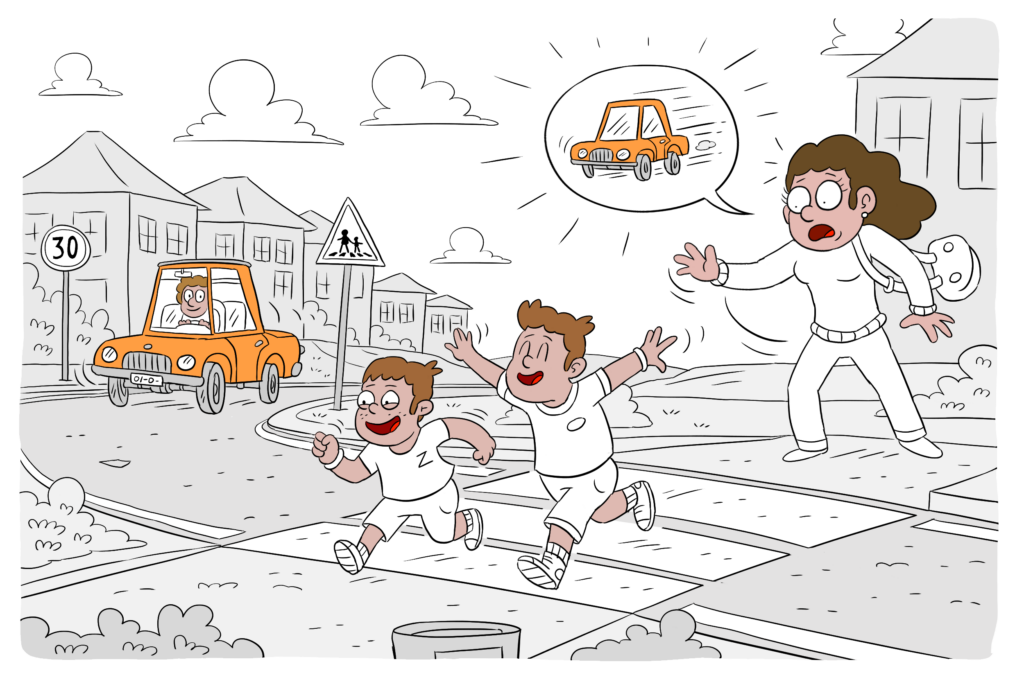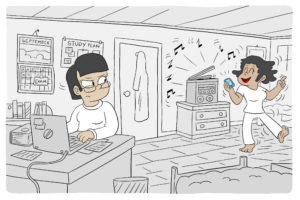Italian Martina recently started working as an au pair for a family with two children: Jan (ten years old) and Pieter (five years old). She is very kind and caring, but tends to get anxious easily. As an au pair, Marina naturally feels responsible for the children under her supervision. One day the boys want to play outside independently in the playground across the street. In their enthusiasm, they run across the street without looking at the cars. Martina is startled and angry because the boys are so careless.

Another view
Martina: Jan is old enough to take care of himself. He even walks to school on his own or with friends. I am amazed that he has been doing that since he was eight years old! In Italy, that would never happen. People in traffic don’t pay attention to anything!
Jan: Martina is very sweet. We are lucky to have such a nice nanny, only sometimes she just gets angry and we don’t understand why. From mom and dad we are allowed a lot, and they let us be free in what we do. But she acts so difficult sometimes. It feels like she’s always worrying about things our parents don’t worry about.
The circumstances
Right in front of their house is a crosswalk. The people who live there know to drive slower on that part of the street, so the children feel safe crossing freely. It is also a 30-kilometer zone. Martina knows about this rule, but she doesn’t trust the motorists. At that very moment, the bus arrives and stops at the bus stop, perhaps without noticing the children crossing the road! What about the other car? It does drive slowly but who knows, maybe that woman is looking the other way or is on an app! Martina is startled and angry, panicking. ‘That’s not normal, is it? How can those boys be so careless?’
Explanation
Of course, it is natural for everyone to be concerned about children. Especially when you have responsibility over other people’s children! We can’t always explain everything with culture either. One person is more concerned than another. One child looks out better than the other. One family lives on a busier road than another. There are so many factors not related to culture.
Yet the basic confidence that “everything will be all right” is different in Italy than in the Netherlands. In Holland, people see fewer dangers and parents encourage their children to go out and explore the world independently. There is less fear of the unknown. In a culture where people prefer to avoid that uncertainty, such as Italy, parents tend to warn their children of all the possible dangers in the world and monitor the situation more closely. There is little trust other motorists, for example. That’s why Martina is startled and angry.
Where is the connection?
So the background of the difference in how safety is perceived is partly cultural. Martina thinks it is really dangerous and she obviously feels responsible for the safety of the children. But it would help her if she realizes that what is perceived as “dangerous” varies by culture. That will give her more confidence in the attitudes of the children, their parents and other road users.
But parents also play a role here. In the Netherlands, children are used to playing in the street, pedestrian crossings are respected and local traffic keeps to the speed limit. The crosswalk is less dangerous than Martina thinks. At the same time, they can also support Martina in her desire to keep emphasizing to the children that it is better to wait and pay attention to traffic before crossing the street.
In short
For Martina:
- Accept that people in the Netherlands see a little less danger.
- Trust that traffic rules are basically respected.
- Try not to project your anxiety too much onto the children, but
- Above all, ask the parents your questions and express your surprise. The Dutch are used to being addressed directly.
For parents:
- Conversation safety and street rules.
- Reassure Martina, but also respect her. She needs to gain confidence in Dutch traffic behavior.
- Express your appreciation for Martina’s care and share that appreciation with the children.
Important to know:
This anecdote is based on stories shared with us. Connect2Us strives to highlight the dilemma from both sides and not to label people or suggest that one or the other should behave differently. We see in our daily cross-cultural work that awareness by those involved is enough to move toward each other without pretending to be very different. Connect2Us wants to help readers recognize and avoid prejudice. Read about prejudice, discrimination and racism here.

